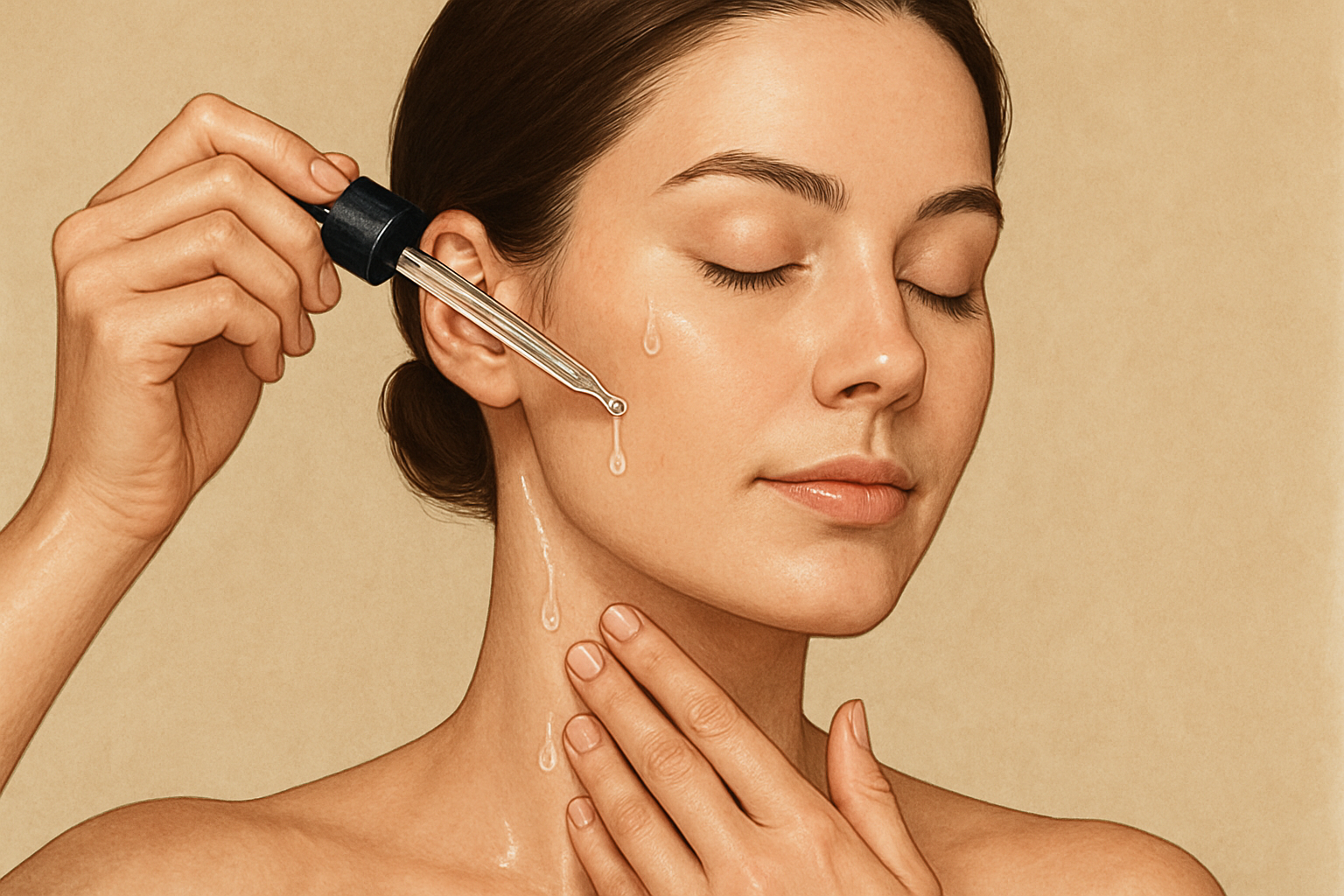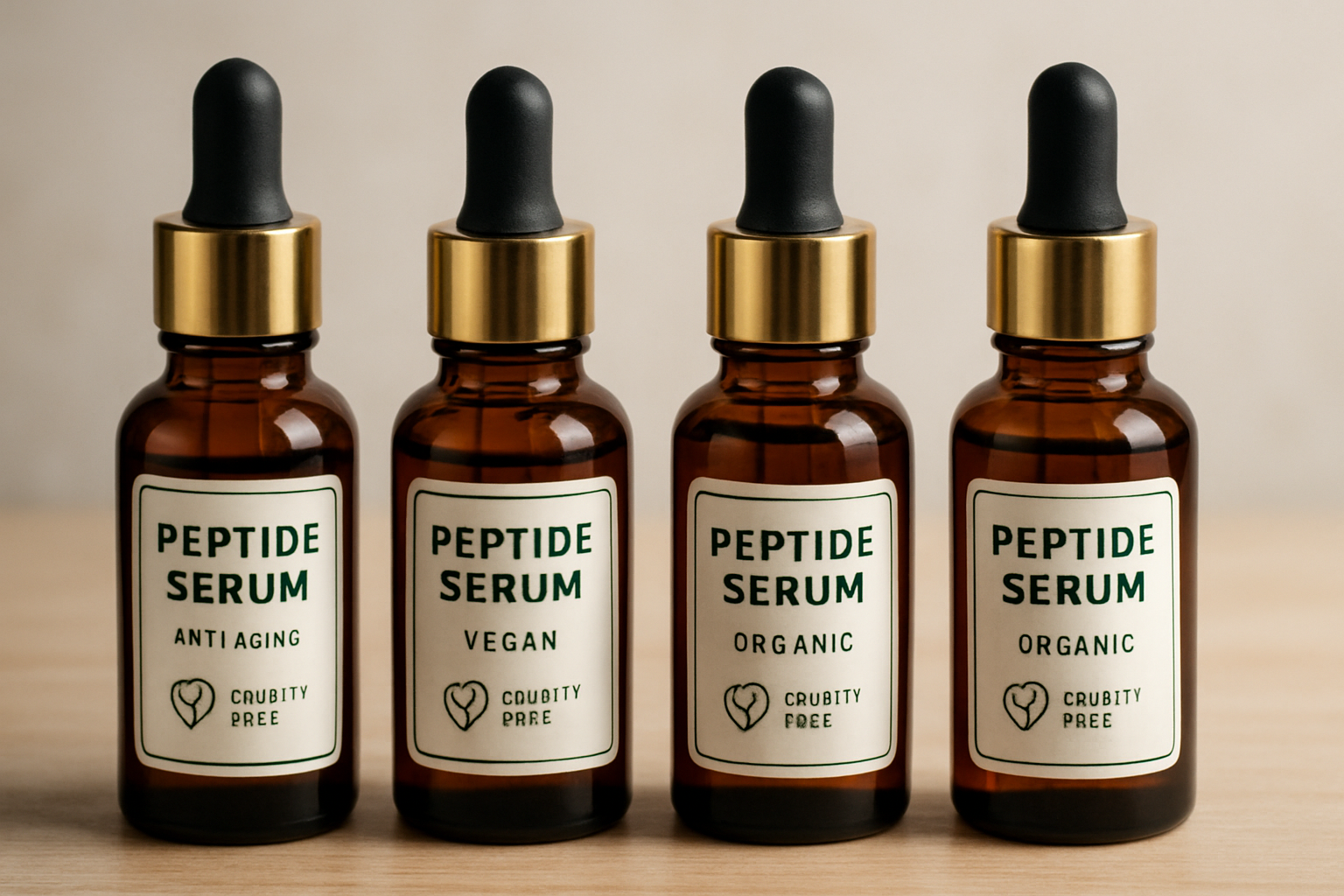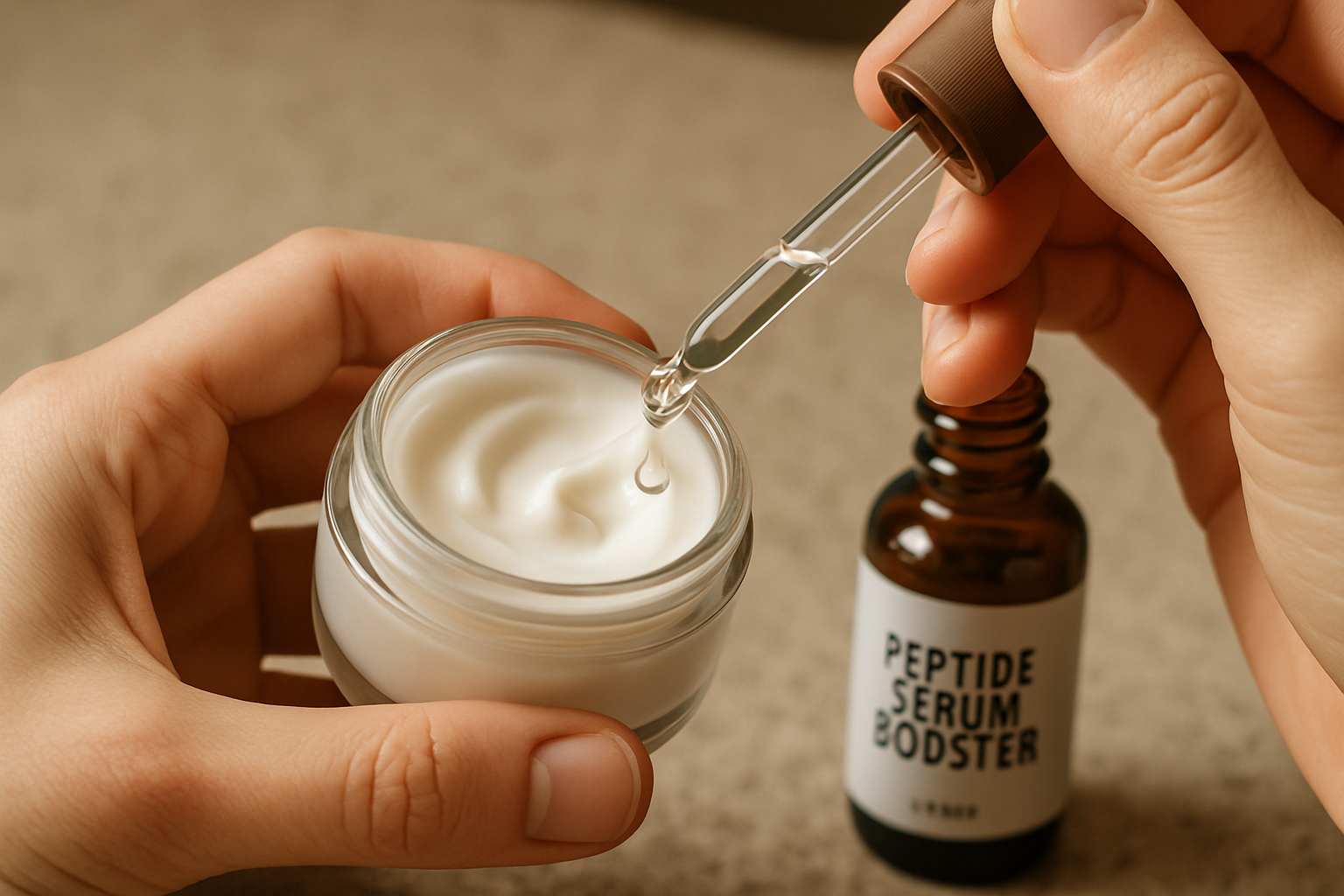
How to Use Peptide Serum for Anti Ageing: A Practical and Gentle Approach
Share
TL;DR: Using peptide serum correctly can boost skin elasticity and reduce fine lines without irritation. Here's your comprehensive guide on how to use peptide serum for anti ageing effectively and gently.
Peptide serums are widely recognised as a cornerstone in modern anti-ageing skincare.
But what are they, exactly?
Here’s a complete, practical cheatsheet on how to use peptide serum for anti ageing and why embracing this ingredient could transform your skincare routine.
Some are gentle on sensitive skin, providing hydration and firming effects without irritation.
Some are formulated with multiple peptides to address wrinkles, elasticity, and brightness simultaneously.
Some combine peptides with botanical antioxidants to soothe and boost skin repair.
Some allow layering with your favourite actives, like vitamin C and hyaluronic acid, for enhanced benefits.
Some fit neatly into minimalist, vegan, and cruelty-free routines, aligned with sustainable values.
Let's dive right in.
What Are Peptides and Why Use Them for Anti Ageing?
Peptides are short chains of amino acids—the building blocks for proteins like collagen and elastin, essential for skin's youthful firmness and smoothness. Over time, natural collagen production dwindles, leading to fine lines and loss of elasticity.
Using peptide serums stimulates your skin to revive collagen and elastin levels, enhancing firmness and reducing wrinkles. Importantly, peptides support the skin barrier, helping maintain hydration and resilience, ideal for all skin types including the sensitive and mature.
Dr Mary Sommerlad, a consultant dermatologist, highlights peptides’ role in rejuvenating skin by promoting key protein production, vital for keeping skin plump and smooth. Learn more from expert insights.
Unlike some actives, peptides are generally low irritation, making them a smart choice for sensitive skin. This approach aligns beautifully with cruelty-free and organic brands like Lulumine, which focus on gentle, sustainable skincare.
How Should You Use Peptide Serum for Best Results?
Consistency and layering matter with peptide serums. Here’s a stepwise approach to incorporate peptides effectively into your daily routine:
- Cleanse Gently: Start with a mild, vegan cleanser suited for your sensitive skin to prepare a clean canvas.
- Apply Peptide Serum: Take a small amount of peptide serum on fingertips and spread evenly over your face and neck while skin is slightly damp. This supports absorption and hydration.
- Layer with Compatible Actives: Peptides pair well with hydrating ingredients like hyaluronic acid and soothing niacinamide. Avoid layering with exfoliating acids (AHAs and BHAs) immediately on top to maintain peptide stability and efficacy.
- Moisturize: Seal in the goodness with a gentle, organic moisturizer suited for sensitive or mature skin. Consider exploring The Ultimate Guide to Organic Moisturizer for Sensitive Skin for expert tips on pairing serums with nourishing creams.
- Protect: In the daytime, finish with an SPF to shield your revitalized skin from UV damage, preserving your skin’s youthful glow.
For optimal benefits, use peptide serum twice daily—morning and evening—as supported by clinical data and user testimonials. Research shows that regular application can visibly smooth wrinkles and improve skin firmness within weeks.
Did you know? Peptide serums often come packed with multiple peptide technologies—like Matrixyl™ and SYN™-AKE—which together boost collagen synthesis and skin elasticity more effectively than a single peptide alone.

What Should You Expect When Using Peptide Serum?
Patience is key. While hydration improvements can be felt almost instantly, the visible reduction of wrinkles and enhanced firmness appears with regular use over several weeks.
Many users report plumper, smoother skin and diminished appearance of fine lines, especially around crow’s feet and laugh lines. This is thanks to peptides’ ability to target collagen production and relax facial muscles that contribute to wrinkle formation.
A common user journey includes:
- Week 1–2: Noticeably better hydration and skin texture.
- Week 3–4: Softening of fine lines and improved firmness.
- Beyond 4 weeks: More radiant, resilient, and even-toned complexion.
One happy customer shared, “My skin feels smoother as soon as I apply it, and with consistent use, my fine lines look visibly softer.” This echoes the experiences reported in studies for peptide serums.Source insights
Can You Use Peptide Serum With Other Ingredients?
Yes! Peptides are versatile and generally play well with most skincare ingredients. They complement vitamin C, niacinamide, and hydrating acids perfectly, enhancing your overall anti-ageing regime.
However, caution is advised with exfoliating ingredients like AHAs and BHAs; these acid-based exfoliants can destabilise peptide bonds if layered directly on top. Consider applying exfoliants at different times or days to protect peptide efficacy.
Dr Marin Locke suggests peptides can be a gentle, complementary addition alongside retinoids for collagen boosting without the usual irritation that retinoids sometimes cause. This makes peptides ideal for mornings or for those with sensitive skin aiming for anti-ageing benefits without compromise.Learn more about peptides as alternatives.
How to Layer Peptide Serum in Your Routine?
Layering peptide serum correctly maximises benefit and minimises irritation. Here’s how:
- After cleansing and toning, apply peptide serum on slightly damp skin for better absorption.
- Next, add antioxidant serums (like vitamin C) to protect from environmental stress, if used in the morning.
- Follow with a hydrating serum or moisturizer to lock in moisture.
- In the evening, peptides can pair well with non-acidic night creams and serums.
Remember, less is more; use minimal amounts of each product for maximum effect. Avoid layering too many active ingredients to prevent sensitivity, especially if your skin is delicate or mature.
Tips for Choosing the Right Peptide Serum
Look for serums that feature:
- Multiple clinically studied peptides (Matrixyl™, SYN™-AKE, Argireline®) for comprehensive anti-ageing benefits.
- Hydrating ingredients like hyaluronic acid to enhance plumping and comfort.
- Fragrance-free, vegan, and cruelty-free formulations, particularly if you have sensitive skin or ethical concerns.
- COSMOS certifications or organic labels that ensure clean, sustainable ingredients.
Choose packaging that protects peptides from light and air, such as dark glass bottles with droppers, to keep the formula stable and potent.
Consider brands like Lulumine that champion gentle, organic, and sustainable peptides designed for sensitive and mature skin.

When Is the Best Time to Use Peptide Serum?
Peptide serums work well both morning and night, but timing can affect results:
- Morning: Helps repair and protect skin throughout the day when paired with antioxidants and sunscreen.
- Evening: Supports overnight skin renewal and collagen synthesis.
The key is consistent twice-daily use. A sample anti-ageing morning routine might include cleansing, peptide serum, moisturizer, and SPF. Evenings can focus on cleansing, peptide serum, and nourishing night cream to support repair.See an example restorative routine.
Can Peptide Serums Help Sensitive Skin?
Absolutely. Peptides are known for their low irritation profile, making them a soothing choice for sensitive, reactive, or mature skin needing hydration and repair without harsh chemicals.
Coupled with fragrance-free, vegan formulas, they support skin barrier health, reduce dryness, and alleviate the appearance of redness and irritation over time.
Patients with sensitive skin often find peptide serums offer benefits similar to retinoids but without the notorious dryness or peeling, allowing gentler, long-term use.
Common Mistakes to Avoid When Using Peptide Serum
- Using too much product — a pea-sized amount is enough; excess won’t speed results.
- Applying on dry skin — peptides absorb better on moist skin.
- Layering incompatible actives immediately — separate use from exfoliants to avoid peptide breakdown.
- Skipping sunscreen — peptides help collagen but don’t protect against UV damage, which accelerates ageing.
- Neglecting consistent use — peptides need daily commitment for visible improvements.
How Do Peptides Differ From Retinoids in Anti-Aging?
Both peptides and retinoids stimulate collagen production but through different mechanisms:
- Retinoids: Increase cell turnover and stimulate new collagen by binding to retinoid receptors. They can improve texture and pigmentation but may cause irritation, dryness, or sensitivity.
- Peptides: Mimic naturally occurring proteins to signal skin cells to repair and produce collagen—offering mild, targeted support with much lower irritation risk.
For many, peptides are a complementary or alternative choice to retinoids, especially when prioritising gentleness and suitability for sensitive skin.See expert discussion on peptides vs retinoids.
Can I Use Copper Peptide Serum for Anti-Aging?
Copper peptides are a potent subclass of peptides celebrated for their antioxidant benefits and ability to further stimulate collagen and elastin synthesis.
When used as part of a routine, copper peptide serums improve skin firmness, elasticity, and overall youthful appearance. They are often used after cleansing and before moisturisers or other serums. Here’s a simple 4-step morning routine featuring copper peptides recommended by skincare professionals:
Applying copper peptide serum sparingly and layering with hydrating sunscreen helps daily protection and rejuvenation without irritation.
Can I Combine Peptide Serum With Other Peptide-Based Products?
Yes, layering serums or moisturisers that contain complementary peptides, such as Matrixyl™, Argireline®, or Syn-Coll, creates a multipronged approach to anti-aging.
It’s also common to add boosters with specific peptides tailored for wrinkle reduction, muscle relaxation, or skin brightening. Just ensure you do not overload your routine and keep products in stable formulations.
Some users enjoy mixing a peptide booster with their favourite organic peptide serum for enhanced results, following clarity on ingredient compatibility and directions.Learn more about peptide cocktail serums.

What Are the Best Practices for Storing Peptide Serums?
Peptides are delicate and can degrade with exposure to light, heat, and air. To preserve potency:
- Store peptide serums in cool, dark places away from direct sunlight.
- Use opaque or dark glass bottles with airtight droppers to limit oxidation.
- Keep the product tightly sealed and avoid contamination by not touching the dropper tip.
- Observe the product’s recommended shelf life and expiry instructions after opening.
Proper storage ensures you receive the maximum skin benefits peptide serums can offer.
Frequently Asked Questions About Peptide Serums for Anti-Aging
How soon will I see results from using peptide serum?
Most users notice better hydration and skin texture within 1-2 weeks, with visible firmness and wrinkle improvements appearing after 4-6 weeks of consistent use.
Can I use peptide serum if I have sensitive skin?
Yes, peptides are low irritation and ideal for sensitive skin. Look for fragrance-free, organic serums designed for gentle use to enjoy anti-ageing benefits without discomfort.
Is peptide serum better than retinol for anti-ageing?
Peptides are gentler, making them suitable for sensitive skin and layering with other actives. Retinol has a stronger, well-studied track record for collagen stimulation but may cause irritation. Both can be used strategically in a skincare routine.
Can I layer vitamin C and peptide serums?
Yes, peptides work well with vitamin C and hyaluronic acid for hydration, brightness, and collagen support. Apply peptides first on damp skin, then vitamin C, followed by moisturizer.
Wrapping Up: The Powerful Benefits of Using Peptide Serum for Anti Ageing
Integrating peptide serum into your skincare routine offers a scientific, gentle, and effective way to boost collagen, restore firmness, and reduce fine lines. The key to success is consistency, proper layering, and selecting vegan, cruelty-free, and organic formulas cherished for both their efficacy and sustainability.
With minimal irritation, adaptability for sensitive skin, and formulation versatility, peptide serums are a nurturing choice for modern skincare enthusiasts seeking radiant, resilient skin.
Take the step today to elevate your skincare with peptides and enjoy a balanced, youthful complexion supported by nature and science.
What's Your Next Step?
Tell us in the comments: How will you apply this to your skincare routine? For personalised advice, contact us!
For more on nurturing sensitive skin and choosing gentle, organic moisturizers to complement peptide serums, visit The Ultimate Guide to Organic Moisturizer for Sensitive Skin.
Explore trusted peptide serums aligned with vegan and cruelty-free principles at Lulumine and start your journey towards glowing, youthful skin today.
(Verified with sources as of 2025-09-04)
